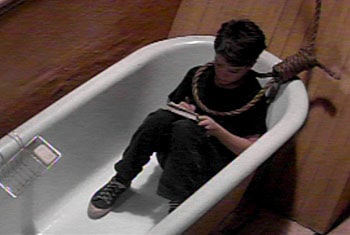“Parce que moi je rêve, moi je ne le suis pas.”
Loosely translated, “since I dream, I am not that”. That saying has become some kind of mantra for young Léo Lozeau (Maxime Collin), who prefers fantasy to the harsh reality. He lives in the then-poor of Mile-End neighborhood with his family, a dysfunctional group of people close to insanity. His grandfather (Julien Guiomar) is a cold, hard man who ain’t really harmful but is certainly not very caring either. His father (Roland Blouin) is an obese blue collar worker with an obsession for bowel movements. He believes that taking a dump every day is essential to good health, so he makes sure his kids do their duty, feeding them laxative if necessary. Leo’s mother (French Canadian chanteuse Ginette Reno) is very fat and maternal, but she’s not very understanding. And then there’s Leo near-retarded bodybuilder brother (Yves Montmarquette) and his mentally challenged sisters (Marie-Hélène Montpetit and Geneviève Samson). Let’s just say you can understand Leo’s need for escapism.
Léo convinced himself that his mother was actually impregnated by a Sicilian tomato filled with the sperm of his real father, making him Italian. Hence, he insists on being called Léolo Lauzone, to his mother’s annoyance. Now experiencing puberty, Léolo is divided between his newfound taste for masturbation and his sublimated love for Bianca (Giuditta Del Vecchio), his angelic Italian neighbor. The film doesn’t have a conventional plot. It’s more of a character study, as the movie gradually deconstructs its young character’s life, mixing childhood memories with dreams. The film is narrated by Léolo, or more precisely by an older voice (Gilbert Sicotte) reading his journals. Writing helps exorcise Léolo’s overwhelming thoughts and urges, as he tries to beat his family’s curse and keep his head.
What you get is an utterly unique film, poetic and thought-provoking by moments, grotesque and scatological by others. It reminds me somehow of Michel Tremblay’s Chroniques du Plateau Mont-Royal and of L’Avalée des Avalés, a brilliant novel from Réjean Ducharme that is directly quoted from in the film. “Léolo” was written and directed by Québécois filmmaker Jean-Claude Lauzon, who tragically died in a plane crash in the summer of 1997. It is obviously a very personal film, and a fantastic one, too. It’s an imaginary autobiography packed with bizarre (and unforgettable) imagery. It’s hard to describe a film life this. It’s undeniably very original, inventive and well crafted, and I love how Lauzon takes his time to get to his point. “Léolo” is a quirky, fascinating masterpiece, and possibly the best French Canadian film ever made.

